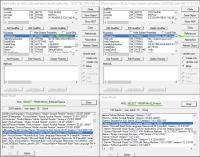-
Type:
Bug
-
Resolution: Fixed
-
Priority:
Medium
-
Affects Version/s: 3.1.4, 3.1.8
-
Component/s: Assets Discovery
-
1
-
Severity 2 - Major
Issue Summary
This is reproducible on Data Center: (yes)
Discovery is using Pattern files, containing commands in order to scan Hosts for information. The responses to these commands are mapped to attributes in the Scan Result XML of the scanned Host Object. These attributes are used to calculate a unique identifier for each Application - an Object Hash.
The Pattern Windows_Application_Product.pat (v3.0.2) will execute the WMI query:
SELECT * FROM Win32_Product
the Pattern Windows_Application_SoftwareFeature.pat (v3.0.2) will execute the WMI query:
SELECT * FROM Win32_SoftwareFeature
Each query may return the same Application, but with different Attribute values, hence a different Object Hash will be calculated, resulting in the same application being created as two different Application objects, each as the result of another Pattern.
As one Host may have hundreds of applications, if some of these are duplicated - an excessive number of Objects will be created.
This happens regardless of Credentials (discovery.exe -l or Discovery with Admin credentials result the same on the localhost running Discovery)
The issue may impact performance during the import and increase the overall object count (may impact Cloud instances with a soft limit to total number of objects, or DC instances requiring to add JVM Memory allocation)
Steps to Reproduce
- Configure a Discovery Import (Cloud or DC) and set up Discovery (min requirements) on a Windows Server - make sure the two Pattern files mentioned above are enabled
- Run a scan (discovery.exe -l or other - provided Admin credentials are saved and available)
- Import the results into your schema (Cloud or DC)
Expected Results
A single Application object is created for each application
Actual Results
Some applications are created twice, with some attributes differences (see screenshots)
...
Workaround
Disable the SoftwareFeatures pattern in Discovery- as this pattern is responsible for the Application objects with least information.
Review the import responses - to make sure that License Objects (if there are any) for Applications are still referencing their applications (does not apply to Windows OS licenses - which will still reference the OS objects accordingly)
- has a regression in
-
JSDSERVER-16231 Assets Discovery Windows patterns are creating duplicate Application objects, due to different attributes returned by each pattern.
-
- Gathering Impact
-
- mentioned in
-
Page Loading...


